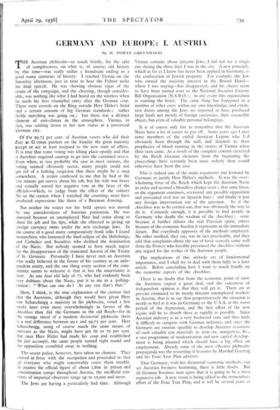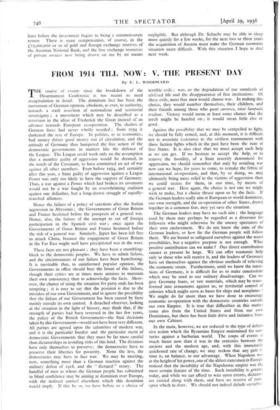GERMANY AND EUROPE: I. AUSTRIA
By H. POWYS GREENWOOD
THE Austrian plebiscite—to touch briefly, for the sake of completeness, on what is, of course, old history by this time—was really rather a humdrum ending to a good many centuries of history. I reached Vienna on the Saturday afternoon, just in time to hear the Fiihrer make his final speech. He was showing obvious signs of the strain of the campaign, and the cheering, though consider- able, was nothing like what I had heard on the wireless when he made his first triumphal entry after the German coup. There were crowds on the Ring outside Herr Hitler's hotel and a certain amount of big German standards ; rather feeble marching was going on ; but there was a distinct element of anti-climax in the atmosphere. Vienna, in fact, was settling down to her new status as a provincial German city.
Of fie 99.75 per cent. of Austrian voters who did their duty as G:rman patriots on the Sunday the great majority accept or are at least resigned to the new state of affairs. It is true that some voting was taking place openly and that it therefore required courage to go into the curtained recess. Even when, as was probably the case in most stations, the voting seemed obviously secret, many people could not get rid of a lurking suspicion that there might be a snag somewhere. A waiter confessed to me that he had at the last minute got nerves about his job, but his wife was brave and actually waved her negative vote in the faces of the officials—which, to judge from the effect of the solitary No in the station when I watched the counting, must have produced expressions like those of a Bateman drawing.
But neither the waiter nor his bold spouse was moved by any considerations of Austrian patriotism. He was annoyed because an unemployed Nazi had come along to share his job and his. tips, while she objected to giving up ;oreign currency notes under the new exchange laws. In the course of a good many comparatively frank talks I found monarchists who lamented the final eclipse of the Habsburgs, and Catholics and Socialists who disliked the domination of the Nazis. But nobody seemed to have much regret for the disappearance of the truncated Austria of the Treaty of St. Germain. Personally I have never met an Austrian who really believed in the future of his country as an inde- pendent entity, and the one thing every section of the com- munity seems to welcome is that at last the uncertainty is over. As one dear old lady of 77, who had evidently been very dubious about the Nazis, put it to me in a polling- station : "What can one do ? At any rate that's that."
Here, I think, is the true explanation of the curious fact that the Austrians, although they would have given Herr von Schuschnigg a majority in his plebiscite, voted a few weeks later even more overwhelmingly in favour of the Anschluss than did the Germans in the old Reich—for in the strange ritual of a modern dictatorial plebiscite there is a real difference between 99.1 and 99.75 per cent. Herr Schuschnigg, using of course much the same means of pressure as the Nazis, might have got 6o or 70 per cent. But once Herr Hitler had made his coup and established the fait accompli, the same people turned right round and the opposition crumbled away to nothing.
The secret police, however, have taken no chances. They arrived in force with the occupation and proceeded to shut up everyone who might conceivably cause them trouble. As against the official figure of about 1,600 in prison and ,:oncentration camps throughout Austria, the unofficial esti- mates of impartial observers range up to xo,000 and more.
The Jews are having a particularly bad time. Although Vienna contains about 300,000 Jews, I did not see a single one during the three days I was in the city. A new principle, which as far as I know has never been applied in Germany, is the confiscation of Jewish property. For example, the Jew who owned the majority interest in the Bristol Hotel— where I was staying—has disappeared, and his shares seem to have been turned over to the National Socialist Factory Bill Organisation (N.S.B.0.) ; in any event this organisation is running the hotel. The same thing has happened in a number of other cases within my own knowledge, and exten- sive drives among the Jews are reported to have produced large hauls not merely of foreign currencies, their ostensible object, but even of valuable personal belongings.
It is of course only fair to remember that the Austrian Nazis have a lot of scores to pay off. Some years ago I met some members of the exiled Austri in Legion who lit cl obviously been through the mill, and listened to their prophecies of blood running in the streets of Vienna when their turn came. As a result of the complete control exercised by the Reich German elements from the beginning the proceedings have certainly been more orderly than would otherwise have been the case.
This is indeed one of the main arguments put forward by Germans to justify Herr Hitler's methods. It was the over- whelming force of the Reich which kept the Austrian Nazis in order and secured a bloodless change-over ; that same force, so the argument continues, overawed any possible opposition and prevented civil war on Spanish lines ; and finally it put any foreign intervention out of the question. So if the Anschluss was to be carried out, that was obviously the way to do it. Curiously enough, it is possible to find people in Germany who doubt the wisdom of the Anschluss; some because it further dilutes the real Prussian spirit, others because of the economic burden it represents in the immediate future. But everybody approves of the methods employed. No other method, they say, was in fact practicable, and they add that complaints about the use of force scarcely come well from the Powers who forcibly prevented the Anschluss without any regard for the wishes of the Austrian people.
The implications of this attitude are of fundamental importance, and I shall try to deal with them fully in a later article. Before concluding here I want to touch briefly on the economic aspects of the Anschluss.
There is no doubt that from the economic point of view the Austrians expect a great deal, and the consensus of independent opinion is that they will get it. There are at present estimated to be nearly 600,000 unemployed workers in Austria, that is to say that proportionately the situation is nearly as bad as it was in Germany or the U.S.A. at the worst period of the depression, and the first effort of the new regime will be to absorb these as rapidly as possible. Since Austrian industry is in a very backward state and thus finds it difficult to compete with German industry, and since the Germans are anxious speedily to develop Austrian resources of such valuable raw materials as iron ore, manganese, &c., a vast programme of modernisation and new capital develop- ment is being_ planned which should have a big effect on employment. Already some of the most effective plebiscite propaganda was the restarting of factories by Marshal Goering and his Four Year Plan advisers.
That Germany, with her dictatorial economic methods, can set Austrian business humming, there is little doubt. But all German business men agree that it is going to be a most expensive job. A new strain is being added to the tremendous effort of the Four Year Plan, and it will be several years at least before the investment begins to bring a commensurate return. There is some compensation, of course, in the £15,000,000 or so of gold and foreign exchange reserves of the Austrian National Bank, and the free exchange resources of private owners now being drawn on are by no means negligible. But although Dr. Schacht may be able to sleep more quietly for a few weeks, for the next two or three years the acquisition of Austria must make the German economic situation more difficult. With this situation I hope to deal next week.



























































 Previous page
Previous page